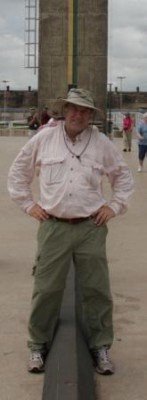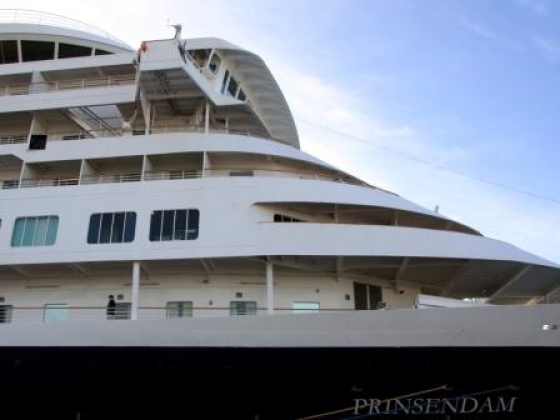This morning at 5am I woke up; I suspect that it had to do with a change in the rhythm of the ship. Obviously, my aging prostate didn’t really mind either. It looked as if we had taken a turn into a tributary of the Amazon to dock in small a place called Santana, about 15 miles beyond Macapà. Small, in this case, means 100000 people.
Before moving on, let me dwell a minute on geography. Macapà has half a million inhabitants, is situated smack on the equator and is the capital of Amapà, the northernmost state of Brazil. An estimate, based on Google Maps, shows the state to be about 60000 square miles, of which 70% is primary, virgin jungle; only 2%of its native forest has been cut, a Brazilian record. Roads are virtually non-existent. The area is so isolated that there are no English-speaking guides. We had people from the nearest city, Belèm, on the southern bank of the Amazon delta, 200 miles away. That translates into a boat trip of 1 day, alternatively a flight of 40 minutes.
The climate is – what else did you expect? – equatorial. The diurnal temperature fluctuates between 24 and 36°C (72 – 96F). There are two seasons: a rainy season and a dry one. In the former it rains all the time (dec-jun), in the latter it rains every day, dixit Alvaro, our “branco” guide (whose English is exemplary). The difference, he says, is expressed in terms of intensity and duration. The dry season sees intense downpours of 5 minutes each; in the wet season the daily showers lasts longer and are more frequent.
Rather hen going overboard on factual data, I better turn to the remarkable events of the day! Well, around 8am all was ready to leave the ship and transfer to the city. We would visit the “Macapà Highlights”, that means: the “Fortaleza de São José”, de local indigenous Art(esinal) Market, the open air museum Sacaca and the “Monumento Marco Zero”.
Apart from Sacaca, there is not a lot to bend over for. To be honest, in Sacaca the fruit was hanging high and, consequently, bending over to get it was not productive either. Moreover, stretching to pick it off the branches was formally forbidden, as well. Anyway, there was an enormous diversity of exotic fruits, which are unknown in North-America or Europe. “Aisa”, for instance, is a small black berry with a lot of big seeds inside and precious little juice. However, these days it is feverishly chased by big international food- & pharmaceutical industries because it contains an inordinate amount of anti-oxidants. They would love to make a multitude of life-craving Westerners druggily dependent on this elixir, and reap the profits!
Which lessons did I learn today?
The first one, chronologically speaking, was that it is impossible to just point-and-shoot! I am taking photography here. My first picture of a Panamanian freighter that was loading wood chips off our stern was not exactly what I expected. It turned out a little steamy, to say the least! Condensation was to blame, and it wasn’t just a thin layer! Binoculars and reading glasses suffered the same ailment. Leaving any kind of cool place requires acclimatizing, and that applies to all bodies and materials. For glass you should count on a few minutes in Amazonas. With regards to getting out of busses, the problem has been solved: from here on, there will be no more air-conditioned buses along the Amazon! It will be sweaty but you can point-and-shoot at your leisure. As always, whether you are at the Equator or at the South Pole, every medal has two sides (I hope to reconfirm that within exactly two months).
The second lesson has to do with water. Rain forest experts don’t stop emphasizing that one has to drink a lot, preferably water. They claim that there are drinking techniques that assure that the water doesn’t run too fast in its natural direction – downward that is! Indeed, the purpose of the exercise is that the water hydrates the body and not that it wakes up a sleepy prostate. How do we accomplish this? Simple: you take one small mouthful of water, let it glide underneath your tongue, where it bobbles a few times from one side to the other, before you swallow it. In other words it is not cluckcluckcluckcluck but rather cluck—cluck—cluck—cluck. I have tried it and am not unhappy with the result. (And my prostate had a quiet, sleepy afternoon as well)
The third lesson has to do with language. Obviously, one day is too short to learn an indigenous language, isn’t it? Well, in the state of Amapà, one can make real quick progress. My attention was drawn to the fact that all local words for plants and some animals (not the Brazilian of Portuguese names) can be reduced to combinations of simple syllables, such as: ma, ca, pa, ba, sa, si, sai, bo, oia, po, ga, li, bi, waia, pi. This series is not exhaustive but quick & dirty math tells me that by combining them into two, three or four syllable words, you can already construct a few thousand words that people of Amapà will understand. The only problem is, most likely, that you yourself might not understand them which, at times, can be somewhat annoying.
These observations summarize the events of the day, apart from a few lingering subconscious sentiments. For starters I felt relieved, happy or otherwise joyous, to finally see a street filled with youthful female charm, and comparable attractive attributes. No surprise, I hope?! The second is, in fact, too complex to explain in the time that I have left here (it is already almost midnight). It concerns a lyric impression regarding the tension between sea and river, Atlantic Ocean and Amazon.
Personally I find it quite moving but I lack the energy, at this moment, to delve into it. I will revisit the subject tomorrow unless … the planned Piranha Fishing would end in disaster but, for now, I won’t worry about that either!
 Ah, I almost forgot! I stood also across the Equator, “Marco Zero”: one leg in the southern hemisphere and one in the northern. I have to admit that it creates a somewhat strange feeling between the legs …
Ah, I almost forgot! I stood also across the Equator, “Marco Zero”: one leg in the southern hemisphere and one in the northern. I have to admit that it creates a somewhat strange feeling between the legs …
Prinsendam, Tuesday January 13, 2011, 2345hrs
Towards the First Meeting of Waters, in Santarem


BTW … I forgot to ask. In a previous post you mentioned something very interesting: that time had a different dimension on board. How is your time experience now?
I wonder what happened with Spinoza’s prostate. But I guess he died a bit too early.